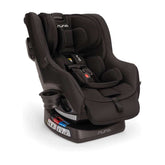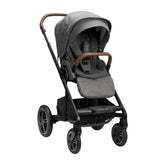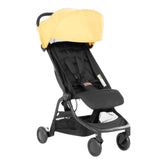Postpartum Recovery: What It's Really Like & How to Prepare

Updated 24 Dec 2024
When you finally hold that new baby in your arms, you’ll likely be awash in many emotions: joy, overwhelm, worry, relief, and absolute love. You may not even notice your own discomfort too much…at first. But make no mistake, giving birth can be a painful experience. Understanding what to expect and how long is postpartum recovery can help you feel a little less anxious about what’s going on with your body and help you concentrate on your newborn.
What Is the Average Recovery Time for Postpartum?
On average, many experts estimate you need about six weeks to heal from a vaginal delivery and about 8 weeks or more to recover from a C-section procedure. In reality, though, many people need even more time to recover from the swelling, tearing, bruising, stitches, and sore muscles. That may sound like ages, but time tends to fly when you’re taking care of a newborn. Let’s take a closer look at a typical postpartum recovery timeline and what you can expect as your body heals. We’ll also examine some postpartum recovery tips and products you’ll want to keep on hand to make healing easier.

Postpartum Recovery Timeline: Week-By-Week
1–3 days postpartum
With the exception of home births, the first couple of days of recovery after delivery will be in the hospital, where your bleeding and vitals will be monitored to make sure they’re normal. If you delivered by C-section, expect to spend the first three to four days postpartum in the hospital recovering. It’s also an ideal time to meet with a lactation consultant for breastfeeding (chestfeeding) advice.
You may experience some continued contractions or cramping, known as “afterpains.” This is normal as your uterus is working hard to shrink down to its original size. The cramping should end after a couple of days, but a heating pad on your abdomen may help you feel more comfortable. Over-the-counter pain relievers (usually ibuprofen or acetaminophen) can help you manage the pain as well.
1–2 weeks
Pace yourself during the first couple of weeks postpartum. From nursing to bleeding, your body is still changing and healing and should be handled with care. Most people will also have a postpartum doctor visit around this time as well.
For many parents (even those who choose not to nurse), your milk may not have come in by the time you leave the hospital. About 3 to 4 days after delivery, your body will start producing breast milk. Nursing parents will likely have many questions, from whether or not the baby is latched correctly to whether soreness is normal. Enlisting the support of other nursing parents or a lactation consultant can be a lifesaver. If you’ve chosen not to nurse, your milk will eventually dry up on its own, but you can speed up the process by wearing a tight sports bra as frequently as you can tolerate and avoiding nipple stimulation. Intense soreness, pain, or breasts that are red or warm to the touch may have a mastitis infection. If you experience this, consult your doctor as soon as possible.
Considerable bleeding and discharge (known as lochia) are normal during the first couple of weeks postpartum. It typically starts out bright red, progresses to a brownish darker red, then to light pink or yellow. Vaginal pain is also normal, particularly if you experienced a vaginal tear during birth or had an episiotomy. Ice packs and over-the-counter pain relievers can alleviate some of the discomfort. You can also expect changes in your bowel movements, typically constipation, due in part to the weakening of your pelvic muscles.
During the first couple of weeks after delivery, your hormones may be all over the place as your body tries to balance itself out. One moment you may feel fine, and the next you’re in tears. The “baby blues,” as they’re often called, are quite common as your body and your life adjust to having a baby. However, if feelings of depression or sadness last longer than the first couple of weeks, talk to your doctor to see whether you may be experiencing postpartum depression.
3 weeks
By three weeks in, you’ve probably gotten a bit more accustomed to your baby’s patterns and are beginning to get the hang of nursing or bottle feeding. During this time, it’s important to continue to handle your body with care, but you can very slowly start to resume some of your regular activities as your strength starts to return. It’s okay to take a walk around the block at this point, but your body is still healing. Don’t start marathon training or having sex yet. You may also still be experiencing some bleeding, but it should have slowed significantly by this point.
6 weeks
At six weeks after delivery, it’s time for a check-in with your doctor to see how you’re healing. You may feel mostly recovered at this point, and your doctor will want to ask you about your physical and mental status. Bleeding should be down to just spotting at most, and your uterus will be back to its pre-pregnancy size. At this doctor's visit, you’ll likely be cleared for both exercise and sex (but it’s important to continue to take it slowly for both). Your regular menstrual period may return, or it may not come back for a while if you’re nursing. Many people also begin to experience hair loss as hormones are trying to level out.

Postpartum Recovery Tips and Essentials
Many people create postpartum recovery kits while they’re still pregnant to make the healing process go as smoothly as possible once they’re home. Here are a few items you’ll want to include:
- Maxi pads, at least a couple of weeks’ worth.
- Witch hazel. This is a must-have in any postpartum recovery kit. Soak maxi pads and freeze to create homemade frozen “padsicles” to ease vaginal pain. Small round cotton pads soaked in witch hazel can help with postpartum hemorrhoids.
- Peri or squirt bottle to rinse off your perineal area while urinating as the area heals.
- Over-the-counter pain relievers, like ibuprofen and acetaminophen, to help with perineal pain and overall aches and cramps.
- Comfy underpants. Opt for cotton or hospital gauze underwear.
- Sitz bath, a little tub is designed for you to just sit and soak away postpartum soreness.
- Postpartum recovery belt to help keep things in place as your abdomen shrinks back to size.
- Lidocaine spray to ease the discomfort of hemorrhoids.
- Stool softener to help with constipation.
- Heating pad to alleviate abdominal cramping or aches and pains in your breasts.
- Nursing pads to help manage leaking breast milk.
- Nursing bras to minimize soreness and make breastfeeding simpler.
- Lanolin or other nipple balms to prevent and treat cracked nipples.

The Takeaway on Postpartum Recovery
The postpartum recovery period is thrilling and stressful at the same time. But by following these postpartum recovery tips, doing your best to care for both yourself and your baby, and having patience with the process, you'll get through it and heal fully. And while you're at it, don't forget to savor this remarkable stage with your newborn. It will be over before you know it!









